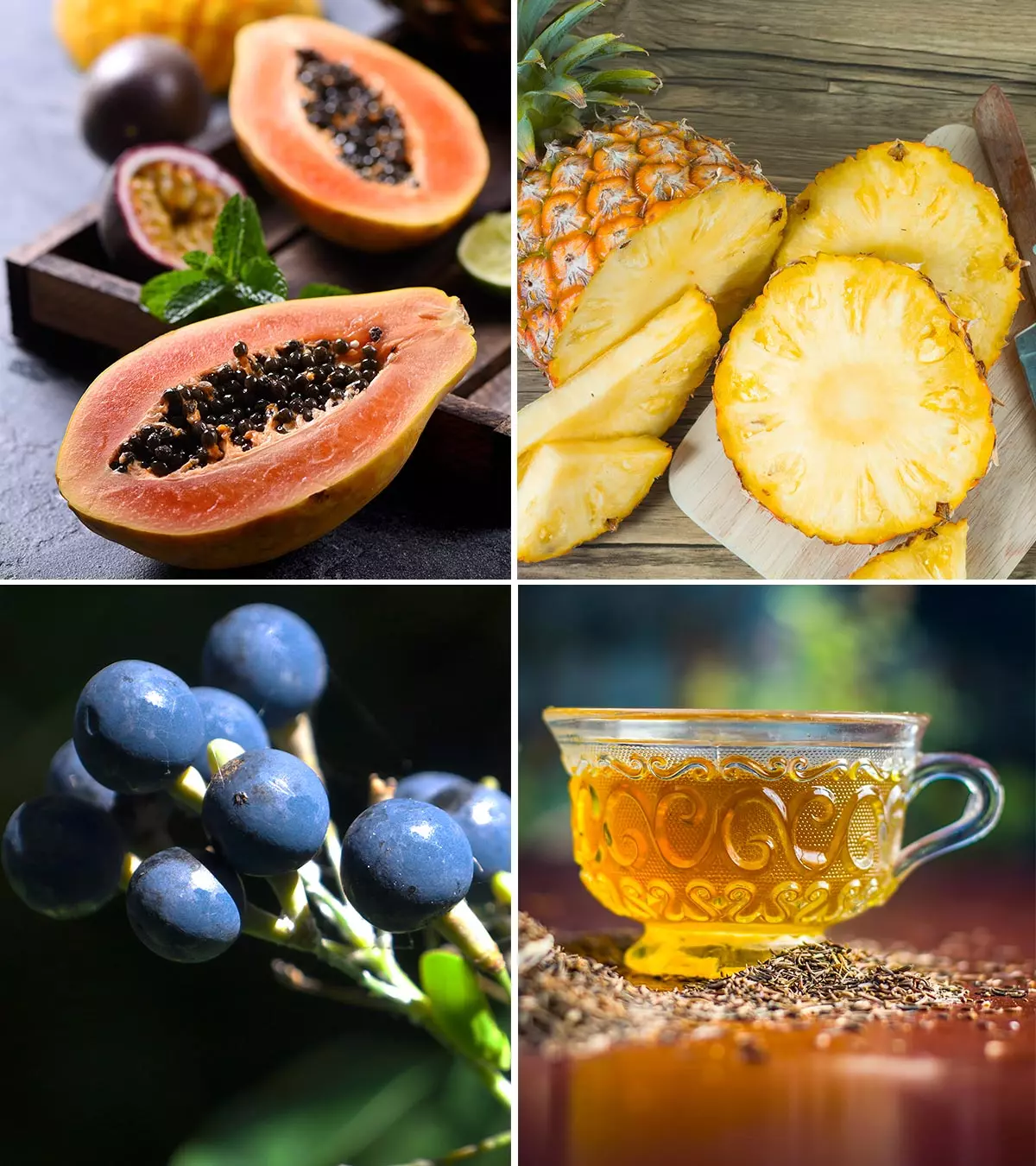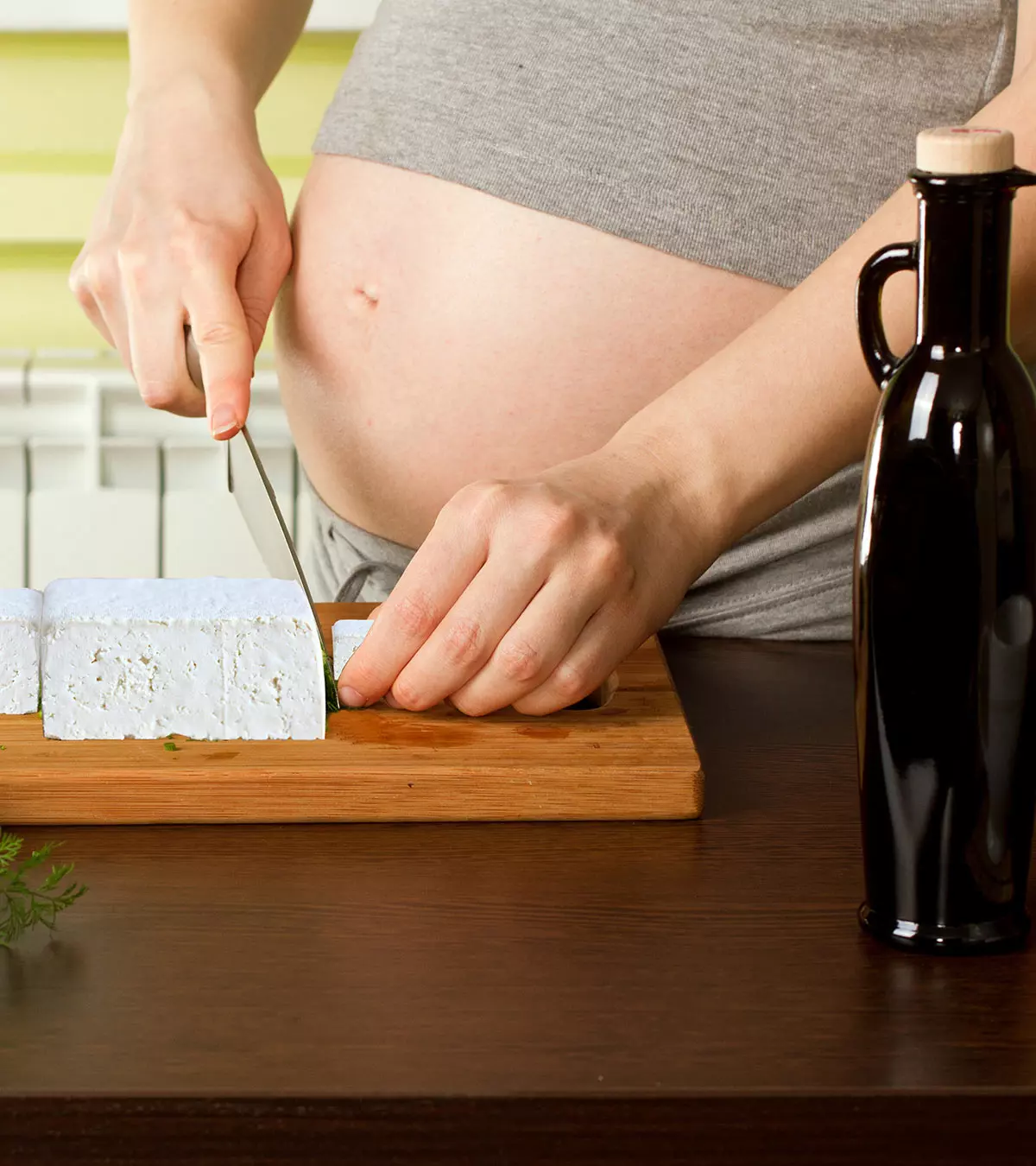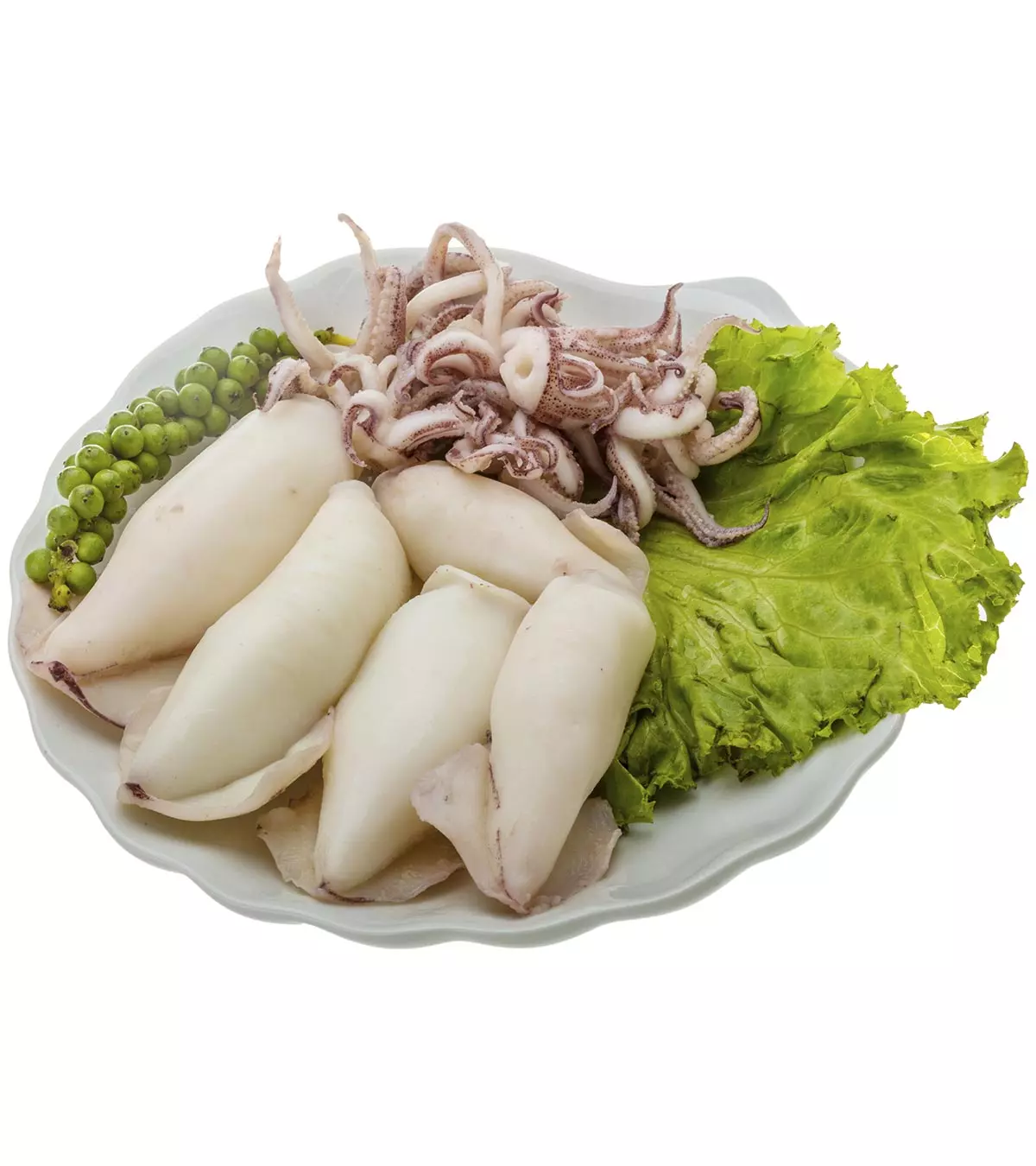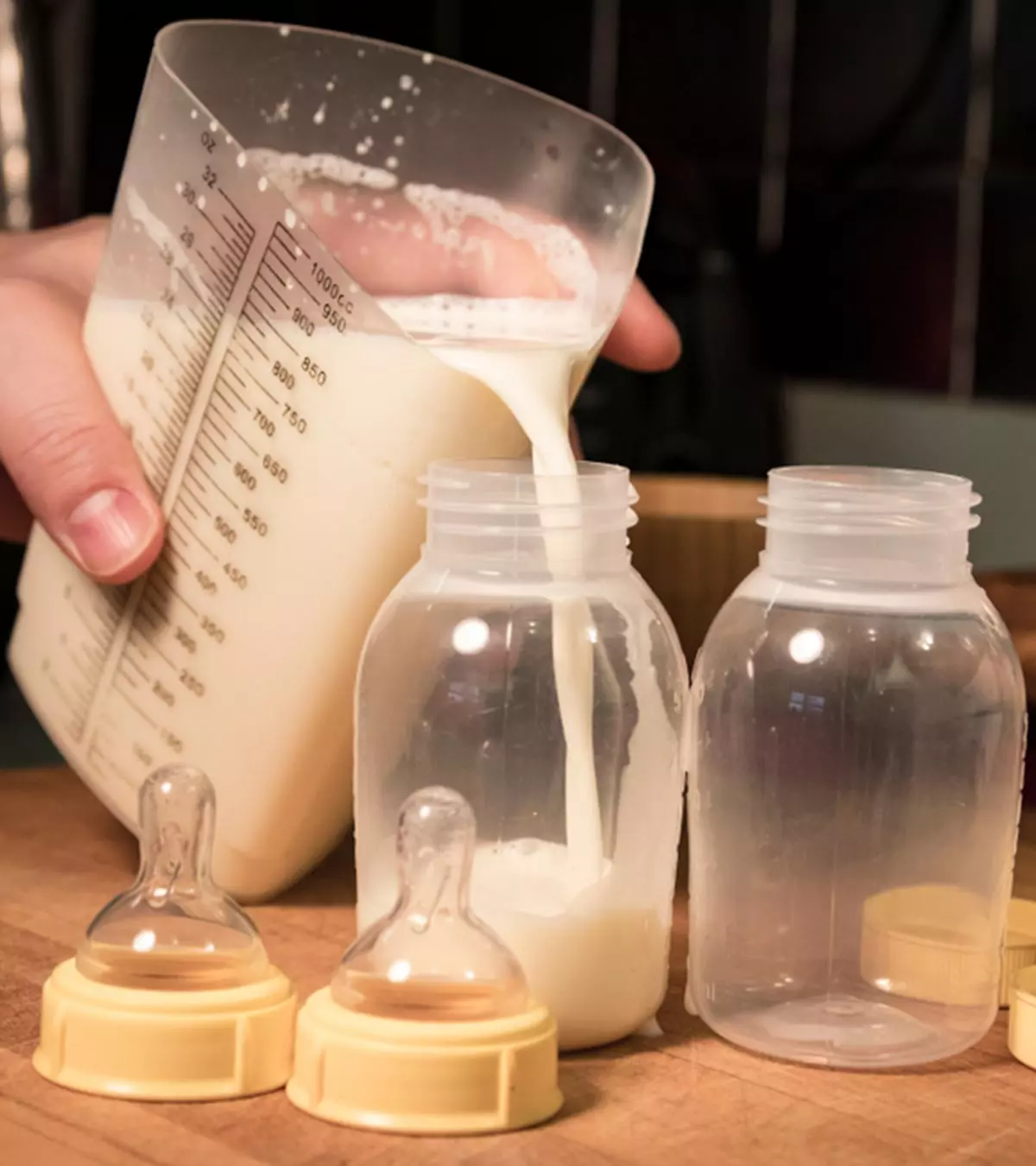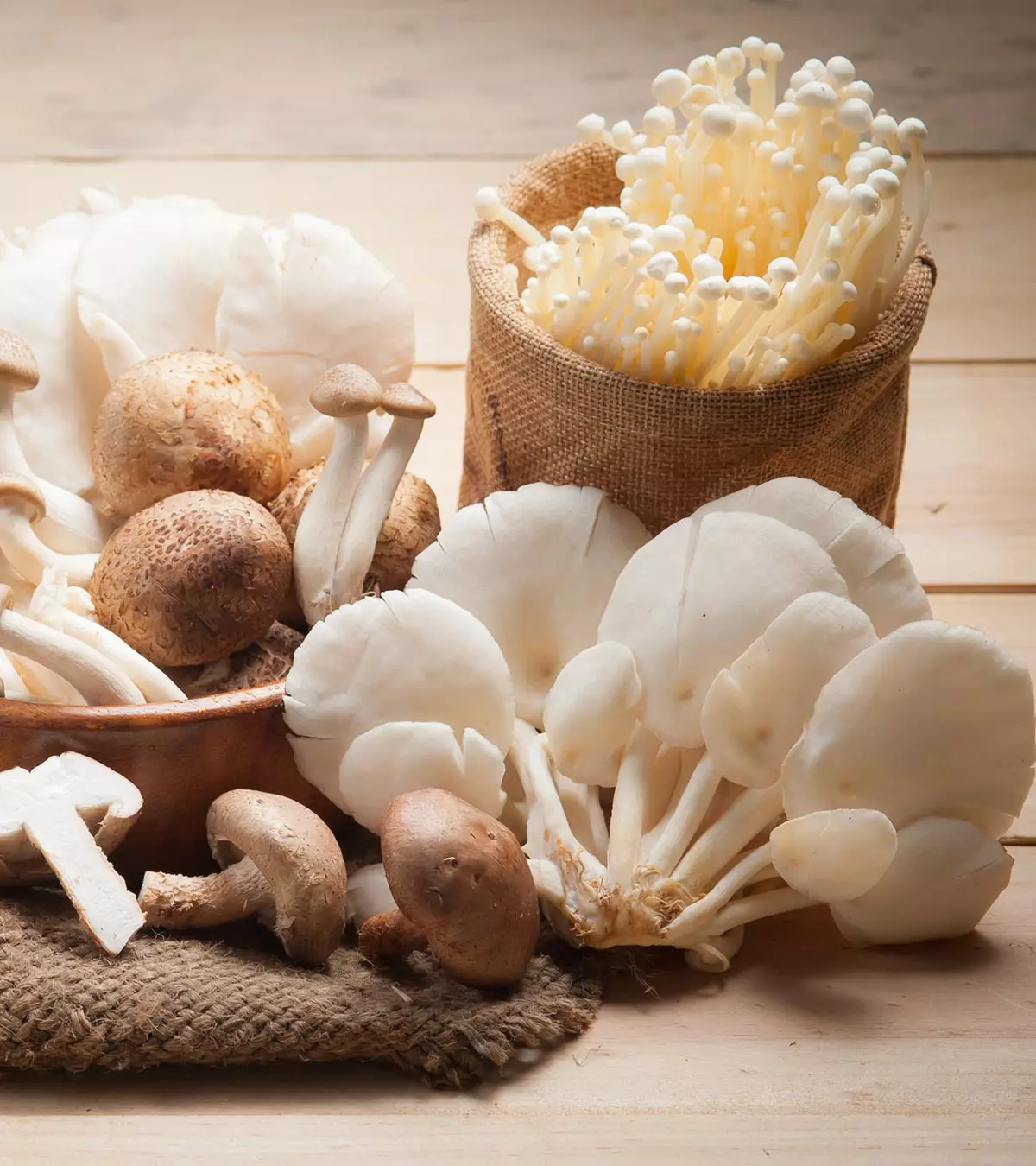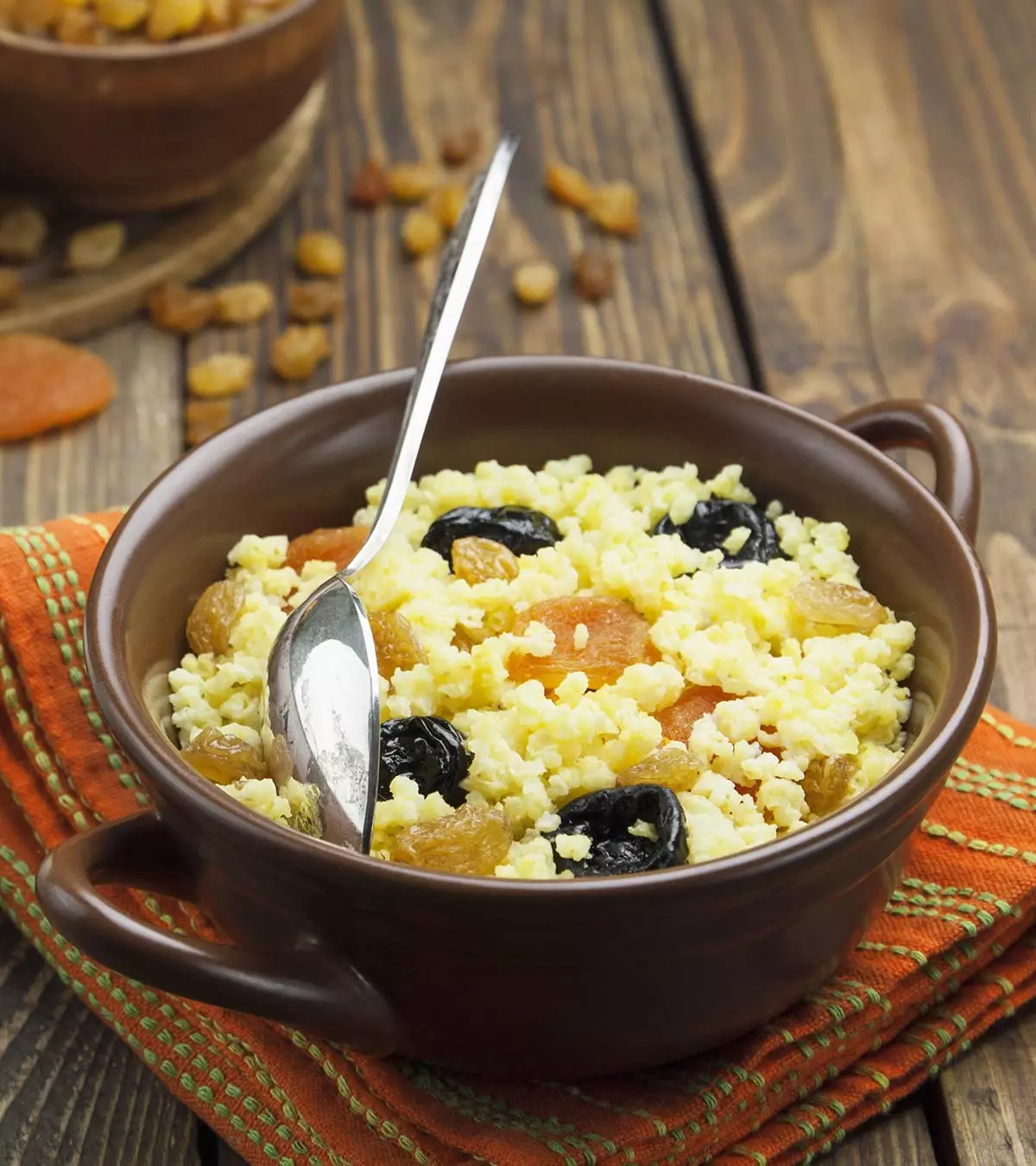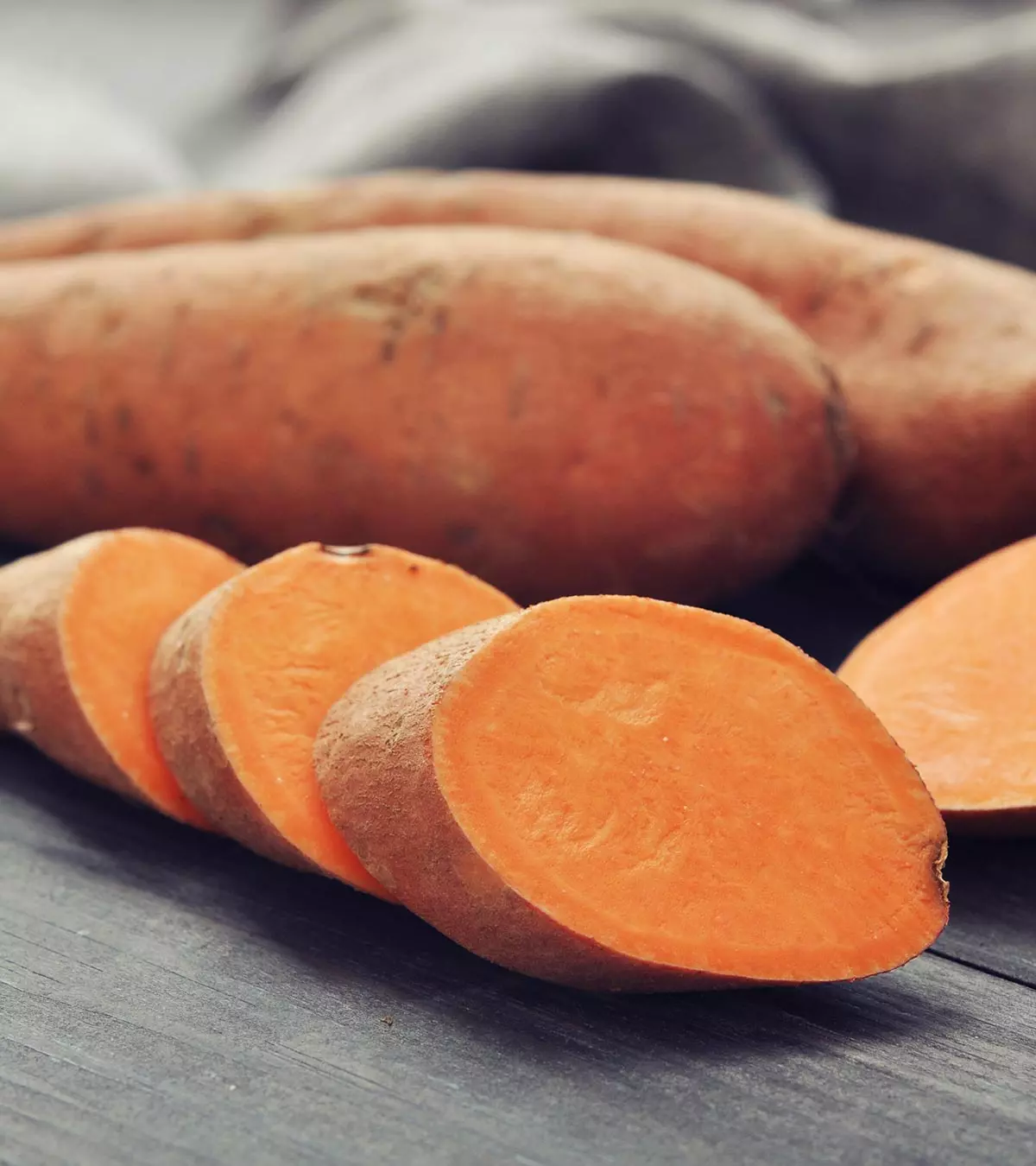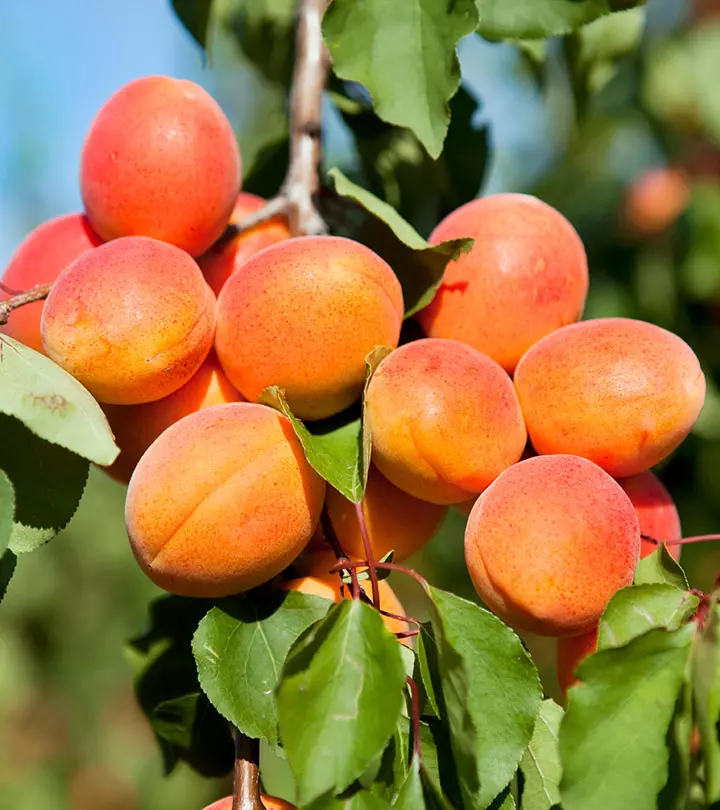
Image: iStock
Apricot, also known as “khuabni” in the Indian subcontinent, is a sweet-smelling perennialiLasting for a very long time. fruit that has a sweet and tart flavor. In addition, it has a juicy, fibrous texture and is rich in vitamins, minerals, and antioxidantsiThese are Natural or synthetic substances that prevent cell damage by free radicals. . Generally, apricot for babies seems a good choice, but feeding it at the right age and in age-appropriate ways is vital to ensure the baby swallows and digests the fruit well.

Read on to learn more about whether babies can eat apricots, when they can do so, their nutritional value, possible health benefits and side effects, how to select and store them, and precautions to take while feeding them to infants. This article also offers some easy and delicious apricot recipes for babies.
Key Pointers
- Apricots are rich in vitamins, minerals, and antioxidants and are extremely hydrating and nutrient-dense.
- Both fresh and dried apricots are safe for babies, with the recommended age to start being six months.
- Apricots can aid in digestive health and immunity, but they also come with side effects such as gastric issues, sulfite sensitivity, or allergies.
- Ripe apricots should always be washed thoroughly before feeding them to your child, and dry apricots should be served in a mashed or pureed form.
- Follow a three to five-day waiting rule to observe any allergic reactions or adverse effects in your child.
Can Babies Eat Apricots?
Yes, babies can eat apricots. The U.S. Department of Agriculture (USDA) suggests feeding ripe and fresh apricots to infants as a source of vitamin A. However, in general, both fresh and dried apricots can be mashed and spoon-fed to babies in an age-appropriate manner.
When Can Babies Have Apricots?

Babies can have fresh and ripened apricots as soon as they start eating solids. Most babies start solids between four and six months of age (1). However, the weaning age may not be the same for all babies. Therefore, consult a pediatrician or pediatric nutritionist about the right age for your baby to start eating apricots.
Once you have the go-ahead from the expert, you can begin serving the fruit to the baby as a homemade apricot puree made from fresh or frozen apricots.
Nutritional Value Of Fresh Apricot
The apricot is available in fresh, dried, canned, and frozen fruit forms. Below is the nutritive value of 100g of raw apricots with skin.
| Name | Amount | RDA |
|---|---|---|
| Water | 87.9g | – |
| Energy | 48Kcal | – |
| Protein | 0.96g | – |
| Carbohydrate, by difference | 10.2g | – |
| Fiber, total dietary | 1.5g | – |
| Sugars | 6.25g | – |
| Calcium, Ca | 12mg | – – |
| Magnesium, Mg | 8.9mg | – – |
| Phosphorus, P | 23mg | – – |
| Potassium, K | 231mg | – – |
| Sodium, Na | 2.5mg | – – |
| Vitamin C, total ascorbic acid | 3.1mg | – |
| Folate, total | – | 24µg (0-6 months) 32µg (7-12 months) |
| Vitamin A, RAE | – | 375RAE/day (0-12 months) |
| Vitamin K (phylloquinone) | – | 5µg (0-6 months) 10µg (7-12 months) |
Sources: U.S. Department of Agriculture and World Health Organization
Possible Health Benefits Of Apricots For Infants
Regular consumption of ripe apricots as part of a well-balanced diet can be helpful in the following ways.
- Hydrating: One cup of fresh apricot contains 134g of water. Besides, it has a good amount of trace minerals like sodium, potassium, and magnesium that help maintain the electrolyte balance of the body.
- Nutrient-dense: Fresh and ripe whole apricots (with skin) can help meet the calorie needs of an infant. Besides, they are a rich source of natural sugars, multivitamins, minerals, polyphenolsiA group of chemical substances in plants, such as phenolic acids, flavonoids, and lignane, that act as antioxidants. , carotenoidsiColored pigments found in plant-based foods that act as a precursor in the synthesis of vitamin A and protect cells from damage. , cyanogenic glucosidesiOrganic plant toxins, found in a variety of food plants and seeds, that help in plant’s defense mechanism. (4), and bioactive compounds such as phytonutrientsiA broad term for compounds found in fruits, vegetables, grains, and beans, possessing health-promoting properties. .
- Digestive health: Fresh and dried apricots have considerable amounts of dietary fiber, which adds bulk to the diet and helps in the easy passing of stools. Japanese apricot is one variety that is known to increase the frequency of defecation, a useful property in relieving a baby’s constipation (5).
- Gut microbiotahealth: Whole apricot and apricot juice are rich in FODMAPs (Fermentable Oligo, Di, Mono-saccharides, and Polyols) that have prebiotic effects helpful in boosting gut microbiota (6) (7). Besides, the dietary fiber can work as a prebiotic (8).
- Immunity: Apricot fruit is known to possess antioxidant and anti-inflammatory properties (9). Both these properties are crucial to back your baby’s immune system. Some studies have shown that regular consumption of apricot kernel oil may enhance the immune system (10) (11). However, its benefits for infants are still unknown.
- Heart health: Fresh apricot and apricot juice contain phenolic compounds, such as anthocyaninsiPlant pigments that give them their purple, blue, or red hue. and anti-inflammatory compounds, such as coumaric acid that has cardioprotective effects (12) (13). Several in vivo studies have supported the consumption of apricots for their cardio-protective effects (14).
- Vision development: Apricots are rich in vitamin A, which supports your baby’s vision and eye health. Serve them regularly to help maintain good eyesight as they grow.
- Overall health: Apricot is known to possess antimicrobial properties that might help fight infections. The fruit also has antinociceptive properties that could promote the use of apricots as a potential nutraceutical in pain management (4).
Regular consumption of fresh apricots is beneficial, yet it has some side-effects that must be explored.
Possible Side-Effects Of Apricots In Babies
It is good to know the side effects to mitigate any problems for the baby.
- Gastrointestinal disturbances: Apricots are rich in FODMAPs. If eaten in large quantities, it could cause gastric issues such as gas, bloating, flatulenceiAlso called farting, it is the act of releasing gas from the digestive system. , and diarrhea (15). If your baby is on breast milk and is showing symptoms of coliciFrequent, prolonged, and intense periods of crying in a healthy baby without any apparent reason. , then check your consumption of apricot (16).
- Allergy: Apricot allergy is not uncommon. Its allergy can either be caused by the cross-reactivity with birch pollen (birch pollen allergy) or peach. In both cases, Oral Allergy Syndrome (OAS) is observed, and thus ingestion of apricot must be avoided. Sensitive individuals with apricot allergy tend to develop allergic reactions to some other fruits and nuts like apple, cherry, plum, and nuts (like hazelnut and walnut) (17).
- Sulfite sensitivity or allergy: Apricot, as dried fruit, is often treated with preservatives containing sulfites. These compounds are known to cause adverse allergic reactions in certain individuals depending on the residue left in the product (18) (19).
Stay cautious and reduce the chances of side effects by selecting and storing ripe apricots in an appropriate manner.
 Be watchful
Be watchfulHow To Select And Store Apricots For Baby Food?
Selection of apricots

- Prefer purchasing all fresh seasonal fruits, such as apricots, from a certified organic shop.
- Give preference to fresh and dried ones over frozen and canned varieties.
- Organic apricots that are tree-ripened are of high-quality. To know the difference, look for the following points.
- Pick plump, fairly firm apricots. However, while you do so, avoid picking apricots that are too firm or have a hard coat, as it indicates that they are not tree-ripened.
- The outer skin should feel delicate and velvety to touch.
- They should have an orange to yellowish-brown color with rich red inside.
- Avoid picking apricots with a green coat, as they are unripe.
- Look for cracks and white spots. If any are present on the fruits, avoid picking them.
- When shopping for dried apricots, pick brown-colored dried apricots because sulfite-treated apricots tend to appear orange.
Storage of apricots
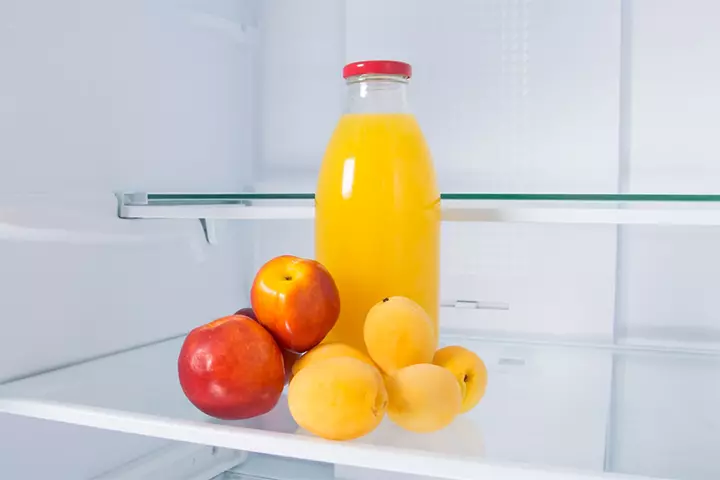
- After purchase, store ripe apricots in the refrigerator, as cool conditions will slow down the ripening process.
- While storing, use a clean glass container or zipped plastic pouch as ripe apricots get spoiled quickly.
- Be gentle while placing apricots in a container or a bag since the fruit can get bruised easily.
- You can store unripened apricots in a paper bag until they ripen.
- Store the cut fruit for later use in a BPA-free plastic container or resealable jars made from glass. The same can be done for mashed or pureed apricots, as well.
Precautions To Take While Giving Apricot To Infants
You may follow these precautions while feeding apricot to your baby.
- Always feed ripe apricot and their products. Consumption of raw apricot (that is bitter in taste) could result in health issues due to the presence of a toxic chemical called hydrocyanic acid.
- If you are using fresh apricots, then wash them thoroughly to remove dust, dirt, and pesticide residue.
- If you want to try dried apricot, ensure that you serve it in mashed or pureed form. Its hard texture could be a potential choking hazard for babies under 24 months.
- Once you introduce apricot to your baby, follow a three to five-day wait rule to look out for any sensitivities, allergies, or intolerances. During this time, avoid including any other new food to your baby’s diet.
- If you are using canned and frozen apricots, then wait until the fruit attains room temperature before feeding it to the baby.
Apricots, when selected and stored well, can be used to prepare several homemade baby food recipes.
Apricot Baby Food Recipes
There are several apricot baby food recipes that you may like to try. However, the most simple and easy-to-prepare recipe is an apricot puree. Though can use either fresh or canned apricots, fresh apricots are preferable.
1. Apricot puree
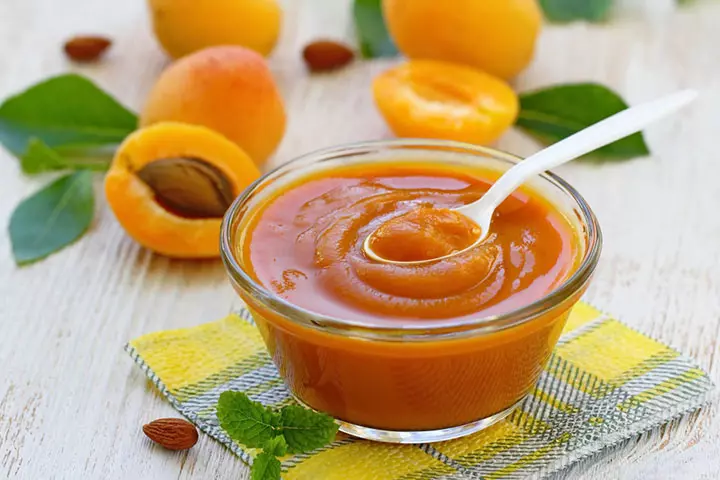
This recipe is an ideal choice for younger babies who have just started solids. You could add breast milk or formula milk to this puree if required. For older infants, it can be mixed with other fruit purees to prepare mixed purees.
You will need:
- 1 cup fresh apricots
- 1 cup water
How to:
- Wash and peel the outer skin of the fruit. If you want, you can steam apricot before use.
- Now, remove the pit and put the fresh fruit pulp into a blender.
- Blend the apricot pulp until you receive a smooth paste. Ensure no lumps are left.
- If required, add water to attain the desired consistency.
- No added sweetener is required, as apricot can provide natural sweetness to the recipe.
Tip: It is not necessary to remove the peel of the fruit before the preparation. If you wish to serve the fruit with peel, then you need to boil the fruit for longer. However, if you want to remove it, then you can put the fruit in boiling water for five minutes and then immediately put it in cold water. This process, called blanching, turns the outer skin soft, making it easy to peel. If you have dried apricots and not fresh ones, then cut them up into pieces and boil in a little water for five minutes or until it is tender. You can now easily blend it into a smooth puree.
 Quick tip
Quick tip2. Nutty apricot and banana smoothie
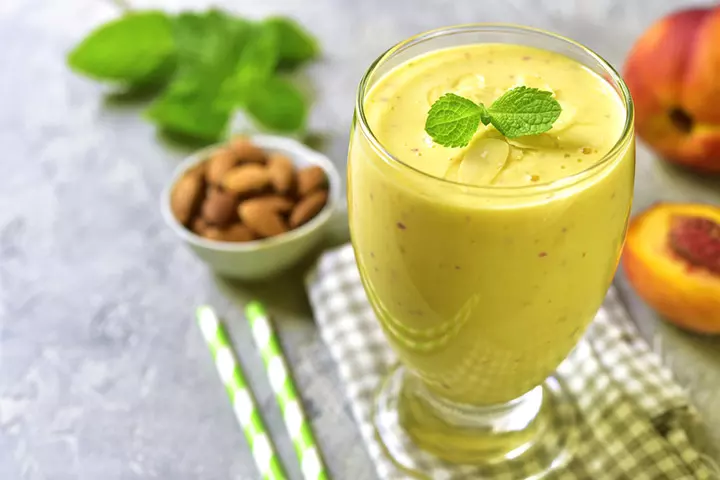
This recipe can be given to the babies once they are about seven to eight months old. It can also make a healthy snack for your toddler.
You will need:
- 1 cup fresh apricots (pulp)
- 1 medium-sized banana
- 1 cup Greek yogurt
- ½ cup mixed nuts (powder)
- 1tbsp mixed nuts (finely chopped)
How to:
- Take a blender and add apricot pulp, banana, yogurt, and nuts powder to it.
- Blend everything well until you get a runny consistency. If required, add water to adjust the consistency.
- Pour the smoothie in a small cup and sprinkle with finely chopped nuts. If you want, you may also sprinkle some finely chopped apricots as well.
- Feed it to your baby instantly. Store leftover amounts in a storage container for later use.
3. Mango apricot smoothie

This recipe is best suited for seven to eight months old babies. Toddlers can enjoy it in between meals.
You will need:
- 2 medium sized mangoes
- 3 apricots
- 1 cup coconut milk or Greek yogurt
How to:
- Wash and peel the mangoes and cut them into small cubes.
- Soak apricots in a cup of warm water for about 15 minutes.
- Add mangoes, apricots, and coconut milk to a blender and blend until smooth.
- You may use water or breastmilk to adjust the consistency.
- Pour in glasses and serve immediately or store in an airtight container and refrigerate.
Frequently Asked Questions
1. Do I have to cook apricots for a baby?
While you can give boiled or cooked apricot to your baby after mashing or making a puree, it is not always necessary. You can feed ripe apricots, peeled or unpeeled, to your baby aged six months and above
2. Is dry apricot good for babies?
Dried fruits, such as dried apricots, can cause choking hazards in babies because they are difficult to chew (20). However, dried apricots can be used to make pureed baby food after boiling or steaming them.
3. How do I introduce apricot to my baby?
Apricots can be introduced into your baby’s diet once your baby starts eating solid foods. You can make baby-friendly apricot recipes using pureed or mashed apricots or combining them with other fruits, such as bananas.
4. How do I know if my baby is allergic to apricots?
Your baby could be allergic to apricots if they display unusual symptoms like rashes, itching, or vomiting after eating them. If you notice these symptoms, stop giving apricots and consult a pediatrician (17).
Apricots for babies can be a healthy choice of first food as they are rich in carbohydrates, fiber, and healthy fats. Mothers may consider introducing apricots as soon as babies start eating solids. It is advisable to give apricots in small amounts initially and report to the doctor if you notice any allergic reactions. Also, give organic and fresh apricots to your child. You can try delicious and healthy apricot recipes such as smoothies and purees or add them to cakes or cookies to encourage your child to consume them.
Infographic: Different Ways To Add Apricots To Your Baby’s Diet
Apricot is a sweet and sour fruit enriched with nutrients. If your baby is six months or older, you can add it to their diet. Besides cooking apricots for puree, you can also include them raw with other foods to add variation and nutrition. Explore the different ways to do that in the following infographic. Illustration: Momjunction Design Team
Illustration: Apricot For Babies: Health Benefits And Easy Recipes To Try

Image: Stable Diffusion/MomJunction Design Team
“Watch this video for a delicious and nutritious apricot and pear puree recipe for babies. Boost your baby’s immunity with this easy to make recipe!”
References
1. Starting Solid Foods; Healthy Children; American Academy of Pediatrician
2. Apricot, raw, FDC ID: 786644; Fooddata Central; USDA
3. Feeding and nutrition of infants and young children; WHO
4. IlkayErdoganOrhan et al.; Insights into research on phytochemistry and biological activities of Prunusarmeniaca L. (apricot); Researchgate
5. Xiao-Jiao Yang et al.; Epidemiological study: Correlation between diet habits and constipation among elderly in Beijing region; National Center For Biotechnology Information
6. Fernando Rizzello et al.; Implications of the Westernized Diet in the Onset and Progression of IBD; MDPI
7. Erika Bujna et al.; Lactic acid fermentation of apricot juice by mono- and mixed cultures of probiotic Lactobacillus and Bifidobacterium strains; National Center For Biotechnology Information
8. OyaBerkayKaraca et al.; Effects of Apricot Fibre on the Physicochemical Characteristics, the Sensory Properties and Bacterial Viability of Nonfat Probiotic Yoghurts; National Center For Biotechnology Information
9. KhaledMoustafa and Joanna Cross; Production, pomological and nutraceutical properties of apricot; National Center For Biotechnology Information
10. Tian H et al.; Apricot Kernel Oil Ameliorates Cyclophosphamide-Associated Immunosuppression in Rats.; National Center For Biotechnology Information
11. M. Minaiyan et al.; Anti-inflammatory effect of Prunusarmeniaca L. (Apricot) extracts ameliorates TNBS-induced ulcerative colitis in rats; National Center For Biotechnology Information
12. TuncayKan et al.; Phenolic compounds and vitamins in wild and cultivated apricot (Prunusarmeniaca L.) fruits grown in irrigated and dry farming conditions; National Center For Biotechnology Information
13. Roy AJ and StanelyMainzen Prince P.; Preventive effects of p-coumaric acid on cardiac hypertrophy and alterations in electrocardiogram, lipids, and lipoproteins in experimentally induced myocardial infarcted rats.; National Center For Biotechnology Information
14. Parlakpinar H et al.; Beneficial effects of apricot-feeding on myocardial ischemia-reperfusion injury in rats.; National Center For Biotechnology Information
15. Suma Magge and Anthony Lembo; Low-FODMAP Diet for Treatment of Irritable Bowel Syndrome; National Center For Biotechnology Information
16. Diet, Breastfeeding, and Colic; C.S. Mott Children’s Hospital
17. Allergy information for: Apricot (Prunusarmeniaca ); The University of Manchester
18. Hassan Vally and Neil LA Misso; Adverse reactions to the sulphite additives; National Center For Biotechnology Information
19. Taylor SL et al.; Sensitivity to sulfited foods among sulfite-sensitive subjects with asthma.; National Center For Biotechnology Information
20. Early years food choking hazards; Food Standards Agency
21. Oral allergy syndrome; British Society for Allergy and Clinical Immunology
Community Experiences
Join the conversation and become a part of our nurturing community! Share your stories, experiences, and insights to connect with fellow parents.
Read full bio of Jyoti Benjamin
Read full bio of Swati Patwal
Read full bio of Rohit Garoo
Read full bio of Ghazia Shah





